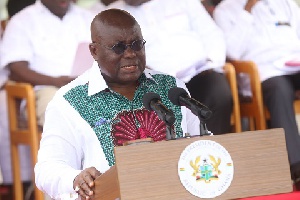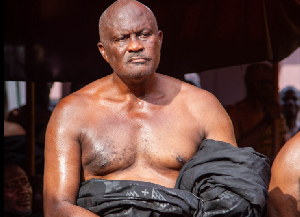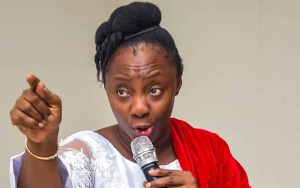On 7th December 2016, discerning Ghanaians found in NPP, a redeemer, in whom they reposed their absolute trust to set them free from the NDC government’s unpardonable economic enslavement.
The impenitent sceptics, indeed, cannot be far from right for suggesting that if discerning Ghanaians had not graciously intervened by showing the dreadful economic managers (NDC) the exit through universal suffrage, the terrible errors in decision-making and the rampant sleazes and corruption would have wiped out Ghana off the world map completely.
Given the circumstances, we can confidently deduce that discerning Ghanaians made the right choice on 7th December 2016 by electing the septuagenarian Nana Akufo-Addo and retiring the middle-aged John Dramani Mahama.
Well, whichever way you may view the topic under discussion, Ghana has regrettably been in the throes of economic collapse due to the erstwhile Mahama’s government’s economic mismanagement and the numerous sleazes and corruption.
Indeed, there is admissible evidence of gargantuan bribery and corruption cases, including monies which were given to parasitic creatures who did not render any services towards the national development. Woyome and Akua Donkor come to mind.
A large portion of Ghana’s scarce resources, regrettably, went down the drain due to the mismanagement and the wanton sleazes and corruptions perpetrated by the officials of the erstwhile Mahama administration.
But in spite of the Mahama’s government coarse administration, the loyalists NDC supporters would want discerning Ghanaians to believe that the erstwhile NDC government provided exceptional governance.
Apparently, vague apprehension of patriotism exists in the minds of many Ghanaians, who prefer needless praise singing to defending the national interests.
The good people of Ghana, unfortunately, witnessed so much duplicities, corruption, incompetence, nepotism, cronyism and frequent abuse of power in the erstwhile NDC government, and hence the vast majority of Ghanaians have permanently lost trust in the NDC.
Take, for instance, if not the Honourable Agyapong’s whistling blowing prowess, former President Mahama’s sibling, Ibrahim Mahama, would have evaded import taxes in the tune of GH12 million. How pathetic?
Thankfully, however, the EOCO ordered Ibrahim Mahama to pay GH12 million as all his previous 44 cheques were dishonoured by the respective banks. How bizarre?
Ghana’s economy, so to speak, took unexpected nosedive after the sudden and unfortunate death of President Mills.
The late Mills successor, Ex-President Mahama and his NDC apparatchiks went haywire in their desperation to cling on to power. Thus they broke all conventions. Many government departments spent over and above their allocated budgets.
As a result, the previously single digit inflation and budget deficit doubled astronomically. The GH9.5 billion debt which former President Kufuor and his NPP government left in 2009 ballooned to GH122.4 billion as of December 2016.
Ghana’s economic growth regrettably slowed for the fourth consecutive year to an estimated 3.4% in 2015 from 4% in 2014 as energy rationing, high inflation, and ongoing fiscal consolidation weighed on economic activity (World Bank, 2016).
Ex-President Mahama’s maladaptive government, as a matter of fact, wilfully dragged the economic growth from around 14 per cent in 2011 to around 3.5 per cent as of December 2016.
In addition, the high inflation rate remain elevated at 18.5% in February 2016 compared to 17.7% in February 2015, even after the Central Bank’s 500 bps policy rate hikes (the inflation stood at 15.8 per cent as of October 2016).
Ex-President Mahama, so to speak, did not work his socks off to improve on the socio-economic standards of living. Take, for example, former President Kufuor quadrupled Ghana’s GDP to a staggering $28 billion in 2008. While the late Mills inherited oil in commercial quantities and managed to increase the GDP to $47 billion in 2011.
However, President Mahama disappointingly reversed the GDP to an incredible $37 billion as of December 2016. That was indeed a quintessence of gross mismanagement.
Gratifyingly, however, since assuming power, the Akufo-Addo’s government has taken commendable strides to improve the social mobility through implementation of poverty reduction policies such as free SHS, one district one factory, one million dollars per constituency, tax reductions, a dam per village in the northern part of Ghana, among others.
And despite the huge economic mess created by the outgone NDC government amid unpardonable stunted economic growth, the Akufo-Addo’s government has efficiently raised the economic growth from a disappointing 3.5 per cent as of December 2016 to over 8 per cent within a short space of time.
Besides, the NPP government has dramatically reversed the inflation rate to a single digit from a little over 15 per cent as of December 2016.
More importantly, the Akufo-Addo’s government has efficiently raised the economic growth within a short space of time. Ghana’s economy grew provisionally by 8.5 percent in 2017 compared to 3.7 percent in 2016 (Ghana Statistical Service, 2018).
Interestingly, the Industry sector recorded the highest growth rate of 16.7 percent, followed by Agriculture 8.4 percent and the Services 4.3 percent.
Services share of GDP decreased from 56.8 percent in 2016 to 56.2 percent in 2017. The sector's growth rate also decreased from 5.7 percent in 2016 to 4.3 percent in 2017.
However, two of the subsectors in the services sector recorded double-digit growth rates, including Information and Communication 13.2 percent and Health and Social Work 14.4 percent.
The Industry sector, the highest growing sector with a GDP share of 25.5 percent, had its growth rate increasing from -0.5 percent in 2016 to 16.7 percent in 2017.
The Mining and Quarrying subsector recorded the highest growth of 46.7 percent in 2017.
The Agriculture sector expanded from a growth rate of 3.0 percent in 2016 to 8.4 percent in 2017. Its share of GDP, however, declined from 18.7 percent in 2016 to 18.3 percent in 2017. Crops remain the largest activity with a share of 14.2 percent of GDP.
The Non-Oil annual GDP growth rate decreased from 5.0 percent in 2016 to 4.9 percent in 2017. The 2017 Non-oil GDP for industry recorded a growth rate of 0.4 percent, compared with 4.9 percent in 2016. Growth in the fourth quarter of 2017 reached 8.1 percent compared to 9.7 percent in the third quarter (GNA, 2018).
It is also a step in the right direction for the NPP government to invest judiciously in technology, given today’s global competitiveness amid evolving technology.
It is for this reason that some of us are most grateful to the NPP government for introducing the Digital Address System and rolling-out the National Identity Card to facilitate the nation building.
Undoubtedly, the introduction of the Digital Address System and the National Identification Card will go a long way to facilitate Ghana’s political, social and economic development.
Based on the prudent governance and the current favourable economic outlook, we can confidently state that Ghana is heading towards the right direction under the able leadership of President Akufo-Addo.
We must, therefore, take solace in the fact that the Akufo-Addo’s government is tackling the erstwhile Mahama’s government economic mess head-on.
Long live Ghana!
Opinions of Saturday, 23 June 2018
Columnist: Kwaku Badu



















